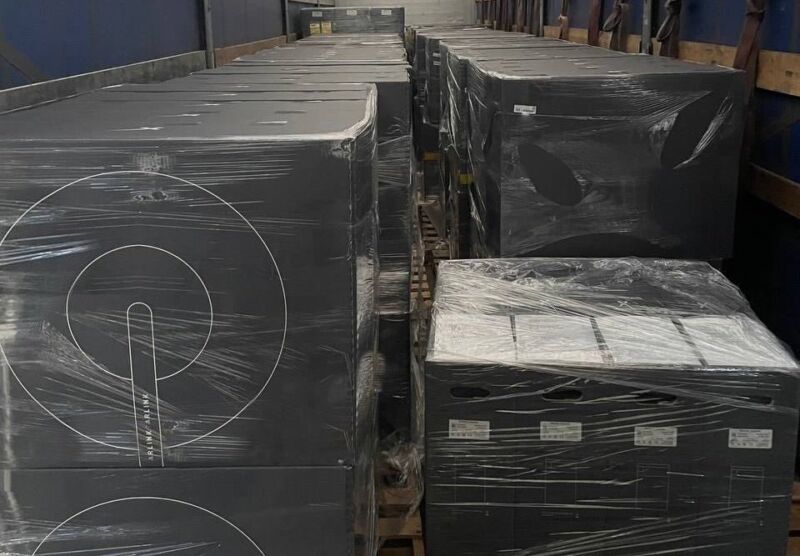
SpaceX’s Starlink Internet is proving to be useful for Ukraine’s military as it fights the Russian invasion. In an article Friday titled, “Elon Musk’s Starlink helping Ukraine to win the drone war,” The Telegraph described how the satellite connection helps the Ukrainian army’s Aerorozvidka (Aerial Reconnaissance) unit do its work of “using surveillance and attack drones to target Russian tanks and positions.”
The Telegraph wrote:
Amid Internet and power outages, which are expected to get worse, Ukraine is turning to the newly available Starlink system for some of its communications. Drone teams in the field, sometimes in badly connected rural areas, are able to use Starlink to connect them to targeters and intelligence on their battlefield database. They can direct the drones to drop anti-tank munitions, sometimes flying up silently to Russian forces at night as they sleep in their vehicles.
The Ukrainian unit’s “most sophisticated drones are connected using Starlink,” The Times of London wrote. “If we use a drone with thermal vision at night, the drone must connect through Starlink to the artillery guy and create target acquisition,” an Aerorozvidka officer told the paper.
The Times wrote that Aerorozvidka “has been picking off tanks, command trucks, and vehicles carrying electronic equipment since the invasion began,” destroying dozens of “priority targets.”
“We strike at night, when Russians sleep,” unit commander Yaroslav Honchar told The Times.
Quality is “excellent,” Ukrainian official says
Ukrainian Vice Prime Minister Mykhailo Fedorov said Starlink is working well in an interview on Friday with The Washington Post. “‘The quality of the link is excellent,’ Fedorov said through a translator, using a Starlink connection from an undisclosed location. ‘We are using thousands, in the area of thousands, of terminals with new shipments arriving every other day,'” The Post reported.
Russian officials are not happy about SpaceX providing help to Ukraine. “When Russia implements its highest national interests on the territory of Ukraine, Elon Musk appears with his Starlink which was previously declared as purely civilian,” Dmitry Rogozin, director general of Russian space agency Roscosmos, said on Russia Today in early March, according to a translation.
“I warned about it, but our ‘muskophiles’ said he is the light of the world of cosmonautics,” Rogozin said. “Here, look, he has chosen the side. I don’t even blame him personally. This is the West that we should never trust.”
Over 5,000 satellite dishes in Ukraine
Starlink is also being used by Ukrainian civilians, though it isn’t clear by how many. The Post quoted an anonymous source who is “familiar with Starlink’s effort in Ukraine” as saying that there are over 5,000 Starlink terminals in the country.
“Fedorov’s agency is working to get Starlink terminals to regions where Internet access has been cut off, he said,” according to the Post. “The systems have in some instances been used to connect people when cellular networks in the country have been overloaded.”
The Starlink app that is used to help set up the service “reached a total of 98,000 installs across Ukraine’s App Store and Google Play combined,” The Wall Street Journal wrote last week. The download number came from analytics firm Sensor Tower.
Ukraine gov’t Tweet was SpaceX’s “permission”
On February 26, Fedorov used Twitter to ask SpaceX CEO Elon Musk to send Starlink terminals to Ukraine. Just 10 hours later, Musk responded, “Starlink service is now active in Ukraine. More terminals en route.”
SpaceX President Gwynne Shotwell later said at a Caltech event that SpaceX “had been working on trying to get permission—landing rights—to lay down capacity in Ukraine… for a month and a half or so,” according to SpaceNews.
“The company, she said, had been waiting for a letter formally granting landing rights, but it never came before Russian forces invaded the country February 24,” SpaceNews wrote. The Fedorov tweet served as permission, according to Shotwell. “They tweeted at Elon and so we turned it on,” Shotwell said. “That was our permission. That was the letter from the minister. It was a tweet.”
Fedorov has tweeted photos of Starlink shipments, including one on Friday. “A new batch of Starlink stations! While Russia is blocking access to the Internet, Ukraine is becoming more open to the entire world,” he wrote. The photos show that Ukraine has received the original version of the Starlink dish instead of the new one, but the two versions have similar capabilities.
Musk warned of Russian attacks on Starlink
Musk warned on March 3 of a “high probability” that Russia will target the satellite dishes because “Starlink is the only non-Russian communications system still working in some parts of Ukraine.” On March 5, Musk wrote that “Some Starlink terminals near conflict areas were being jammed for several hours at a time. Our latest software update bypasses the jamming.”
“Experts have warned that the devices could give away Ukrainians’ locations to Russian attackers, but that hasn’t been an issue so far, Fedorov said,” according to The Washington Post article. “The devices have usually been used in ‘densely populated areas where there would be a lot of civilians anyway.'”
Fedorov also said there don’t appear to be major Russian cyberattacks on Starlink yet, despite Musk’s mention of jamming. “They currently appear to be very busy attacking the websites of our small towns and villages,” Fedorov said. “I think they’re just not at that point yet.”
https://arstechnica.com/?p=1842557

